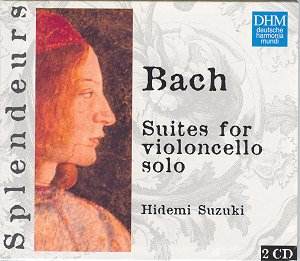Comparison Sets:
Beschi/Winter und Winter
Sheppard/Metronome
Jaap ter Linden/Harmonia Mundi
Deutsche Harmonia Mundi
might have thought that its star would
rise when absorbed by BMG, but its catalogue
has instead been ravaged without mercy.
Fortunately, a new mid-price series
named "Splendeurs" is bringing back
to the market previous DHM full price
releases. I was pleased to receive the
Hidemi Suzuki set of Bach's Suites for
Solo Cello played on baroque cello.
Suzuki has for many
years been an integral figure in the
historically informed performance movement.
Born in Kobe, Japan, he graduated from
the Toho-Gakuen School of Music in Tokyo.
Suzuki studied with Japan's best cellists
and conductors, eventually teaching
chamber music and orchestral playing
at the Toho-Gakuen School. Through a
scholarship from the Japanese government,
he went to Holland in 1984 to study
with the famed baroque cellist Anner
Bylsma and won first prize at the First
International Baroque Cello Competition
in Paris in 1986. Suzuki has played
with the Orchestra of the 18th Century,
La Petite Bande, and the Bach Collegium
Japan in addition to his solo concertizing.
He currently teaches at the Royal Conservatory
in Brussels.
To my chagrin, Suzuki's
performances are not highly rewarding.
Matters of tempo, dynamics, emotional
breadth and conversational levels are
the root causes, giving the interpretations
a rather faceless quality. Although
most of the playing is appealing, I
think it's fair to say that Bach's Cello
Suites convey much more than Suzuki
gives his audience.
The issue of changes
in tempo and dynamics looms large. Suzuki,
in contrast to the excellent sets listed
above, infrequently alters these features
and does so only within a narrow range.
It's straight-ahead playing all the
time that can become tiresome and lacking
in interest. Add in a restricted range
of dynamics, and the readings are sorely
lacking in individuality.
Another deficiency
of Suzuki's set is that he places restrictions
on the spectrum of emotions in Bach's
music, as if he cuts off a large chunk
from each end. Suzuki's performances
have been said to be somber, but I just
think that he is unable to reach the
great exuberance called for by some
of the movements such as the courantes
and gigues. As for depth of expression,
Suzuki doesn't hold a candle to the
ter Linden and Sheppard interpretations.
Suzuki's swells are often weak and his
slurring only mildly effective. Most
significant, he seems to be going through
the motions instead of identifying with
Bach's emotionally rich tapestry.
All the above results
in ineffective voice interaction and
bland conversation. Certainly, the conversational
requirements of the Cello Suites are
immense, and this is the one area where
Suzuki's failings are absolutely critical.
I can't remember the last time I was
so unimpressed with the voice interaction
in a recording of the Cello Suites.
Even in versions I have not liked very
much, such as the Pieter Wispelwey sets
on Channel Classics, the conversational
level is much more captivating than
from Suzuki.
The recorded sound
is excellent, and the set comes with
the original booklet notes that are
highly informative and insightful. However,
these fine features are extraneous to
Suzuki's playing which simply does not
keep pace with the abundant competition
from other baroque cello recordings.
In conclusion, Suzuki's
set of the Bach Cello Suites represents
a pleasant evening's entertainment,
but nothing more. I find it hard to
believe that Suzuki does not find more
in this music than it has to communicate,
but the proof is in the performances.
I recommend passing on this set and
instead considering the sharply etched
and exciting Paolo Beschi performances,
the rhythmically active and intense
Susan Sheppard set, or the deeply moving
Jaap ter Linden interpretations.
Don Satz


